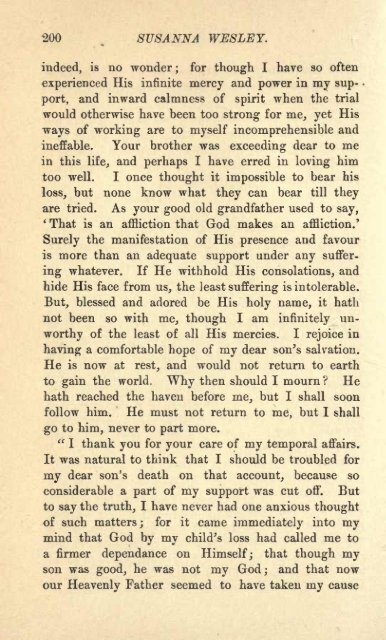Susanna Wesley
This is the story of Susanna Wesley, 1669-1742 Mother of Charles and John Wesley, who were founders of the Methodist Church. Susanna and her husband, Samuel, had nineteen children, ten of whom survived to adulthood. Her son Charles became a well-known hymn writer and her son John became the found of Methodism. Susanna was brought up in a Puritan home as the youngest of twenty-five children. As a teenager, she became a member of the Church of England. She became the wife of a chronically debt-ridden parish rector in an English village. She said, "I have had a large experience of what the world calls adverse fortune." Nonetheless, Susanna managed to pass down to her children Christian principles that stayed with them.
This is the story of Susanna Wesley, 1669-1742 Mother of Charles and John Wesley, who were founders of the Methodist Church. Susanna and her husband, Samuel, had nineteen children, ten of whom survived to adulthood. Her son Charles became a well-known hymn writer and her son John became the found of Methodism.
Susanna was brought up in a Puritan home as the youngest of twenty-five children. As a teenager, she became a member of the Church of England. She became the wife of a chronically debt-ridden parish rector in an English village. She said, "I have had a large experience of what the world calls adverse fortune." Nonetheless, Susanna managed to pass down to her children Christian principles that stayed with them.
You also want an ePaper? Increase the reach of your titles
YUMPU automatically turns print PDFs into web optimized ePapers that Google loves.
200<br />
^<br />
SUSANNA WESLEY.<br />
indeed, is no wonder ;<br />
for though<br />
I have so often<br />
experienced His infinite mercy and power in my support,<br />
and inward calmness of spirit when the trial<br />
would otherwise have been too strong for me, yet His<br />
ways of working are to myself incomprehensible and<br />
ineffable. Your brother was exceeding dear to me<br />
in this life, and perhaps I have erred in loving him<br />
too well. I once thought it impossible<br />
to bear his<br />
loss, but none know what they can bear till<br />
they<br />
are tried. As your good old grandfather used to say,<br />
'<br />
That is an affliction that God makes an affliction.'<br />
Surely the manifestation of His presence and favour<br />
is more than an adequate support under any suffering<br />
whatever. If He withhold His consolations, and<br />
hide His face from us, the least suffering is intolerable.<br />
But, blessed and adored be His holy name, it hath<br />
not been so with me, though I am infinitely unworthy<br />
of the least of all His mercies. I rejoice in<br />
having a comfortable hope of my dear son's salvation.<br />
He is now at rest, and would not return to earth<br />
to gain the world. Why then should I mourn? He<br />
hath reached the haven before me, but I shall soon<br />
follow him. He must not return to me, but I shall<br />
go to him, never to part more.<br />
" I thank you for your care of my temporal affairs.<br />
It was natural to think that I should be troubled for<br />
my dear son's death on that account, because so<br />
considerable a part of my support was cut off. But<br />
to say the truth, I have never had one anxious thought<br />
of such matters; for it came immediately into my<br />
mind that God by my child's loss had called me to<br />
a firmer dependance on Himself; that though my<br />
son was good, he was not my God; and that now<br />
our Heavenly Father seemed to have taken my cause

















